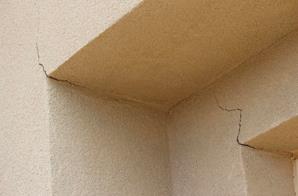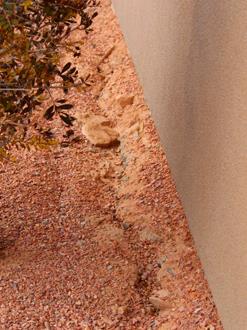Homeowners in the gated Highland Hills retirement community in Mesquite continue to await word from the city and other involved parties regarding intent and plans to rectify damages which are a result of either grievous past mistakes or willful neglect in the planning and public works departments.
 |
| The Lacher residence |
Highland Hills has some of the most beautiful views in the valley, but it is built upon an old landfill, used from 1988 to October 1994 for disposal of waste of every type, including raw sewage and toxic chemicals. When the landfill was operational, it was legally prohibited from handling such volatile substances, but after it closed, documents show that it had been accepting chemical refuse for an undisclosed period of time.
The community was built by RFMS, a developer from Illinois, after receiving the necessary permits from the City of Mesquite in 2005. RFMS focuses on the building of retirement communities and senior care facilities, and has developed several neighborhoods in Mesquite. When purchasing homes in the development, residents were unaware of the location of the old landfill in connection with their properties.
In February and again in April 2014, residents appealed to the Mesquite City Council with concerns for their homes and health. They also requested that their certificates of occupancy, administered by the city, be rescinded. Despite their voiced fears, medical issues and sinking houses, they have yet to hear any answers or proposed solutions from the city.
Highland Hills resident and HOA committee member Colin Warren has gathered binders of documents and information regarding inaccurate landfill boundary lines, and the allegedly mishandled permits and improvements by the city and other involved entities. In a letter to the City of Mesquite dated Feb. 25, 2014, Warren cited the following groups as being connected to the problems at hand: The City of Mesquite, RFMS, Vector Engineering, the Southern Nevada Health District, Alford Inc., Premier Realty (the developer’s sales party), and Landmark Engineering (a St. George-based firm responsible for the Revised Closure Plan and Post Closure Maintenance Plan for the landfill).
  |
| The Stroup residence |
As mandated by city ordinances, property lines were not to come within a 200-foot radius of the landfill, yet Warren and other members of the community have been collecting documents which show that there are up to 17 properties closer than the boundary, a few of which sit directly atop the landfill.
The condition of the homes in Highland Hills continues to deteriorate. Bob and Barbara Lacher’s foundation is cracking, and before being recently torn up for a second time due to burst pipes, their driveway was splitting apart. Jim Stroup tried to measure the depth of a crack in his driveway with an eight-foot stick, and had to hold onto the end to keep it from falling into the crevasse. He then dropped a tape measure into the crack and measured it to be 30 feet deep. At other times, the measurement has come back at around 17 feet, suggesting that the contents under the surface continue to shift.
Even more concerning for the residents is the possibility of exposure to methane gas. Methane gas inhalation is known to cause headaches, dizziness, heart palpitations, exhaustion, and if potent enough, even death.
Before learning of the landfill situation, Barbara Stroup was experiencing some of the symptoms: Headaches, dizziness, and exhaustion. After having multiple medical tests performed, she and her husband were tired of searching for answers to her health problems. Their doctor could not confirm nor rule out the possibility of methane poisoning, but suggested that they take a three-month vacation to see if her health would change.
RFMS provided the Stroups with another Mesquite house to temporarily relocate to, and after being away from Highland Hills for two months, she said that her condition has improved.
If not properly handled, methane gas buildups are susceptible to explosion when ignited. Warren said that he originally thought that the landfill area was simply a burn area, to dispose of weeds and brush. Before the discovery of the landfill boundaries, he went outside one day to burn a few sticks behind his home, and was shocked when they “blew 80 feet into the air.”
The groundwater surrounding the landfill has a sordid history as well. The day after the closure of the landfill on Oct. 8, 1994, a new law enforced by the Nevada Environmental Commission Regulation went into effect, which stated that an existing municipal waste landfill within one mile of a drinking water intake must comply with groundwater monitoring requirements. Thus, by closing the landfill, the City of Mesquite avoided the cost of monitoring equipment, and having to monitor the water at all.
 |
| The Lacher residence |
“This is a complex issue, and the details go back quite a few years,” city manager Andy Barton said. “Most people who were in the relevant divisions at the time are no longer employed by the City of Mesquite, due to retirement or moving on.”
Due to the shifting earth, water pipes have been leaking and bursting since July 2013. Water escaping from broken pipes underground has residents concerned that it will carry methane and chemical pollution into the unaffected parts of the subdivision. RFMS has appeared more responsive than the city regarding the matter, but in an email to the Lachers dated May 23, 2014, the company leaves an open-out to avoid responsibility by stating, “If RFMS determines that it is not responsible for a later permanent repair, the removed driveway panel will be replaced at that time.”
Water from broken pipes near the Lacher home was tested; Warren said it held 21 different chemicals, including chloroform, a compound that was employed as an anesthetic decades ago, but because of damage it causes to the heart, liver and kidneys, is no longer used in modern medicine. The highly flammable tetrahydrofuran was also shown to be present, along with benzene, a proven cancer-causing agent.
Highland Hills residents want answers, and while RFMS has been in contact with the HOA to relay that they are working on a solution, they have yet to hear just what it will be, and are even more frustrated by the silence from the city.
“We found that most doors are closed when you start asking questions,” Barbara Lacher said.
Las Vegas-based law firm Marquis, Aurbach and Coffing has now taken over public relations for the case, and is not readily answering questions from the press or private citizens.
Barton indicated that the firm was assigned to the case by the State of Nevada due to Mesquite’s association with a state insurance pool.
“We were appointed to the Las Vegas firm at the request of the state,” he said. “Those attorneys have recently met with RFMS, and the city will be speaking with all parties to work on the issue.”
Highland Hills residents continue to anxiously await word on the future of their homes and their lives. Many said they wish to avoid long and lengthy litigation, and are hoping that the city will handle the situation without needing to engage in a legal dispute. But for the time being, mum’s the word.
“I feel badly for the people who are dealing with these issues in their homes,” Barton said. “So does the City Council. And the City Council intends to do the right thing. All parties involved will come together to solve this.”




